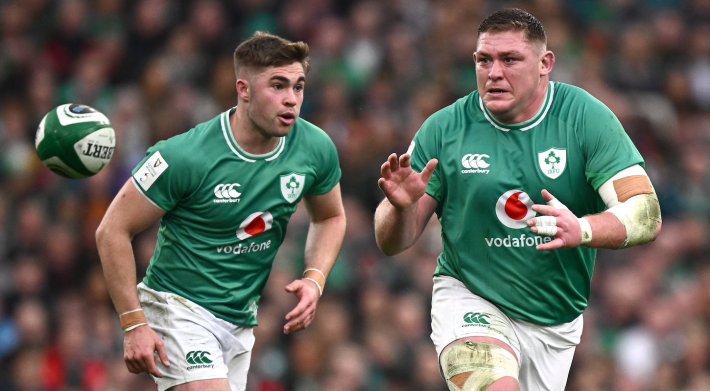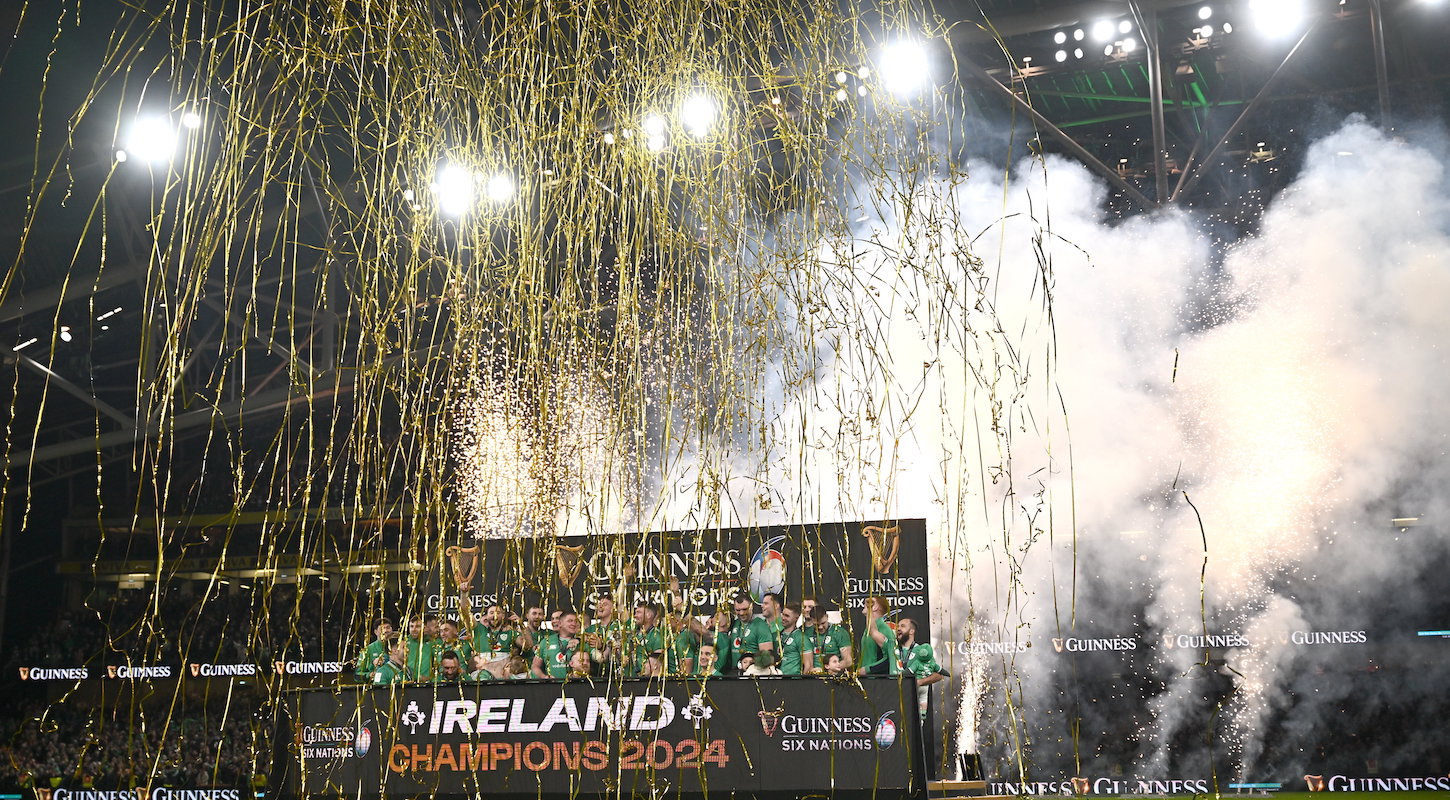Ireland held off Scotland, 17-13, in Dublin to capture the 2024 Six Nations Championship and keep its place atop European rugby.
The Six Nations is a round-robin competition for Europe's best teams in a sport where you never wait long for a tush push to break out. The event dates back to 1883, and every squad in this year's field is now ranked among the Top 10 teams in the world. The Irish side is currently No. 2 in the globe, behind only reigning World Cup champion South Africa. But for now Ireland runs Europe: The Irish went 5-0—a Grand Slam—in last year's tourney, and came into yesterday's match with visiting Scotland needing only a draw to finish atop the Six Nations table for the second year in a row.
Ireland dominated possession and field position throughout the match, but Scotland's bend-but-don't-break defense, Irish turnovers during a particularly one-sided second half, and a missed penalty from Ireland's normally dependable and always hunky fly-half Jack Crowley gave the visitors a puncher's chance into the early evening. And when Scotland's Huw Jones broke up the middle for a long run and a try at the 77-minute mark, the upstart visitors were just one score away from pulling off a massive upset.
But Ireland regained possession and played conservative, error-free, three-inches-and-a-cloud-of-dust rugby to run out the game's last three minutes, and the championship they were always expected to win was again theirs.

Ireland's shot at consecutive Grand Slams had ended last week with an upset loss to England in Twickenham, 23-22, on Marcus Smith's walk-off drop-goal for the hosts. England, however, surrendered a late score in a loss to France yesterday to end up in third place in the final 2024 Six Nations standings.
Ireland's rivalry with England, sources say, has at times throughout history transcended the rugby pitch. But it's also found in the sport, for sure. Rugby's roots go back to the 1840s and the town of Rugby, England, where the first set of rules were drawn up. The oldest rugby club still up and running, however, can be found at Trinity College in Dublin, which formed its own in the early 1850s.
The Irish national rugby team predates England's theft of six Irish counties for the United Kingdom and the partitioning of the island into two countries, Ireland and Northern Ireland. But the Republic of Ireland squad accepted players from the new country after the split. England's evil deeds were even evident in the decades-long debate over what anthem to play before rugby matches. Some players from the north didn't feel right hearing only the Republic's anthem, "Amhrán na bhFiann" ("The Soldier's Song" in English). And those from the south surely weren't going to happily stand pat for "God Save the [King/Queen]." So in 1995, the Irish Rugby Union commissioned its own anthem, “Ireland’s Call,” that is now a fixture on every pre-game playlist. (Relatedly, in hurling and Gaelic football, sports whose history is closely tied to Irish nationalism and the fight for independence from England, "Amhrán na bhFiann" is played before matches even in Northern Ireland, but "God Save the King" is not.)
Ireland has reached across Irish Sea to benefit the rugby team: Current head coach Andy Farrell, who's been in charge and thrived since 2020, is an English national. Yet given the past, nobody should be surprised that while celebrating Ireland's tournament championship yesterday, some sage meanies with Gaelic leanings took time to kick the English while they're down by sending faux congratulations for winning the “We Beat Ireland Cup” this year.
And Ireland fans have had their share of disappointment, too. The Six Nations win will take away some—but hardly all—of the sting from the team's disappointing finish in last year's Rugby World Cup. Ireland went into that tournament ranked No. 1 in the world, but also with a long history of folding in World Cup quarterfinal rounds. And after beating eventual champion South Africa in the group stage, the Irish got knocked out yet again in the quarters, as one possession after another ended short of the goal line—or, in the crucial moment, literally one inch off the ground—against New Zealand.
Ireland captain Peter O’Mahony’s possibly imminent retirement was a leading talking point on the final day of the 2024 Six Nations. He was shown crying during the playing of “Ireland’s Call” before the Scotland match, and right after the final whistle was asked by a TV interviewer if this was indeed it for him. “If it was my last one,” O’Mahony said with an amazing Cork accent, “it’s not a bad one to go out on, you know what I mean?”
The house PA blasted one Irish pop rocker after another– “Zombie” from the Cranberries, Thin Lizzy’s “The Boys Are Back In Town” and U2’s “Beautiful Day” among them– as O’Mahony joined his mates on a stand set up in the center of the pitch to hoist the fifth Six Nation’s trophy of his career. Fireworks shot in the Dublin sky and everybody in the stadium screamed. Happy St. Patrick’s Day.






